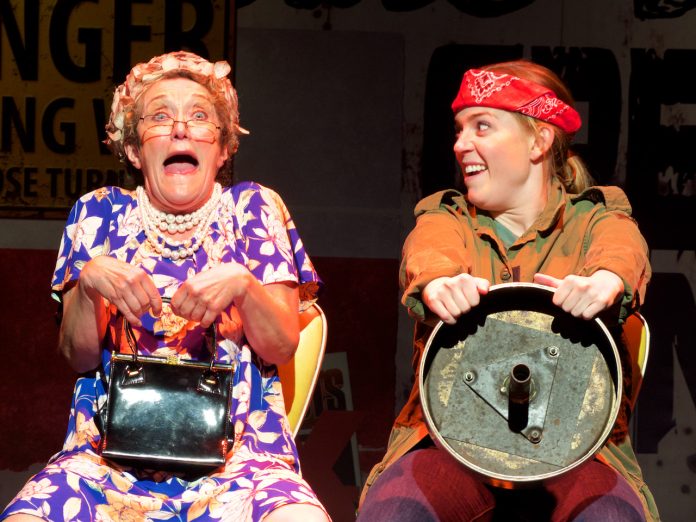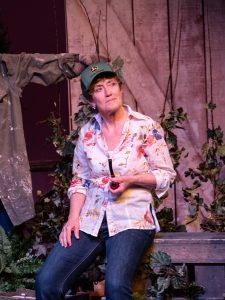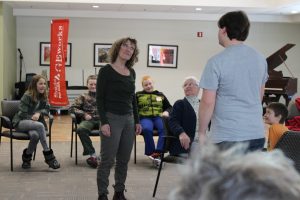
Theatregoers have seen her don dozens of identities. Children know her as pirate performer Barnacle Betty. Countless others across a range of ages have known her as teacher, producer and director. But no matter how she’s known, Robin Clipsham has been core to the theatre scene in Muskoka for decades.
Clipsham helped establish the local improv community while contributing to the growth of the theatre scene overall. She founded theatre companies Muskoka StageWorks and PRISM Theatre in the Park along with appearing in local shows and teaching the craft. She’s worked with students of all ages, and much of her work has been with school-age children. It’s fitting since she discovered her love of being on stage as a child. Though it may surprise the people who know her today, she started as someone afraid to hear her own voice.
“I had a wonderful teacher who recognized how shy I was and how I was never going to put my hand up,” Clipsham said. “She just plucked me out in about Grade 8 and said, ‘We’re going to do a school play this year, and you’re going to play the lead.’”
Clipsham remembers being in that room with “absolute horror and absolute delight” swirling around inside her. The experience dismantled her fears of public speaking and sparked a passion for performing.
“That was the first time that anybody actually saw me and what I loved and what gave me my life’s blood,” she said.
Cultivating a career
Hoping to serve her love of performing, she studied theatre at York University years later.
“I always knew that I needed something more stable in my life,” Clipsham said. “My parents were certainly all about that, so I went on to Teachers College and I became a theatre arts educator.”
Since then, Clipsham has spent decades teaching acting. She taught theatre performance and production at Nipissing University along with teaching subjects like English and Performing Arts at Bracebridge and Muskoka Lakes Secondary School (BMLSS). Her teaching career has also expanded to include workshops and coaching.
She teaches courses at the YMCA for adults in their 20s to 70s and leads workshops for local schools. She’s also hosted March Break camps at the Opera House, spoken at events for organizations like the Muskoka Authors Association and adjudicated events like the National Theatre School DramaFest.
Her teaching career has been fulfilling in so many ways, but something was missing. Then, while she was teaching, a person saw her just like her Grade 8 teacher did.
“I was standing in the gymnasium watching a show on the stage with my students and with my colleagues,” Clipsham said. “A colleague was standing beside me and just kind of elbowed me and he said, ‘You’d rather be up there with them than down here with us, wouldn’t you?’”
She was surprised at his comment because it rang so true for her. He said it was “oozing out of [her] with every pore,” so when he asked her what it felt like not to be on stage, she started to reflect.
“That was a really profound moment in my life where I was forced to confront what I had done because I had effectively stopped the pipeline,” she said. “I hadn’t done any shows for 20 years, so then I joined the church choir and started doing community theatre and then auditioned for a professional production.”

She got her Equity card through the company after a few performances, leading her to split her time between acting and teaching. Since then, she’s had too many favourite roles to mention. Her work has brought her to venues across Ontario, and she’s also traveled to British Columbia and New Brunswick to perform a one-woman show.
Acting and teaching have struck a wonderful balance for her because she’s able to learn on the job at all times. Each acting job informs her teaching and vice versa. Being both a practitioner and a teacher means that she teaches from a place of firsthand knowledge and experience while continually striving to become an expert in the discipline of performance.
“Being an educator actually helped me to pose the questions about acting and playing roles and bringing stories to life that I needed to answer for myself and, therefore, for others,” she said. “The students and their questions helped me to focus on the questions, to seek the answers, to learn, just as I hope I was helping them to learn along the way.”
She’s grateful for the chance she’s had to collaborate with her students, and a key example of that has been through the practice of improvisation.
Turning to improv
A major part of Clipsham’s role as a leader in Muskoka theatre comes down to how she helped establish improv in the area. Now, after COVID, it’s a task she’s performing once again.
She was teaching at BMLSS in 1993 when it all started. She received a letter inviting her and her students to the Canadian Improv Games. She called the number on the mailer to learn more about the competition and decided to assemble a team. With a workbook and an instructional video in hand, she approached a Grade 12 student named Margaret who had been hosting talent nights each month.
“I said, ‘Margaret, if you and I can get five of your friends to do this, we can have a team,’” Clipsham said. “We had 30 show up from our first announcement on the PA system, and that’s how improv was born at BMLSS.”
The team competed for 15 years before making it to nationals. They joined 19 other teams from across Canada to compete at the National Art Centre in Ottawa.
While the team from BMLSS was building up their team, schools in Huntsville and Gravenhurst were creating their own. By 2000, there was a thriving local improv community. Other teams in Sudbury, Parry Sound, Barrie and Innisfil cropped up as well, and a “north of Toronto region” formed.
Just before the pandemic, the regionals for the Canadian Improv Games were held in Huntsville. Clipsham acted as coordinator and held a workshop for local students, enlisting the help of her former improv team to lead. A team from Huntsville High School won the regional finals, but soon after, the local improv community took a major hit.
“All that’s gone because of the pandemic,” she said. “We’re just slowly, slowly, slowly building the ladder again. It’s just like a tsunami came in and wiped out the whole village.”

Many of her students, both school-age and adults, take improv workshops and courses to socialize and improve their communication, especially after the pandemic. Improv is a wonderful team sport that not only promotes communication but also teaches a range of other important skills, she said.
Participating in the Canadian Improv Games nationals was a peak experience for her, so Clipsham hopes the Muskoka improv community will be able to revive itself, especially because the type of improv work in the games goes beyond the usual performance-based exercises of most groups.
Clipsham compared it to the differences between recreational skiing and ski racing. Both use similar approaches and skills, but ultimately, one is more formal and disciplined. Still, one of the best things about improv is that it’s open-ended. She remembers the intimidation she felt taking classes at Second City, a well-known improv school and comedy club, but no matter the setting, all ideas are welcome in improvisation.
“Improv teaches you that there is no such thing as the right answer,” she said. “There are only offers. There are only ideas. There’s only sharing. And that is such a safe place to be.”
Acting and improv are a great way to open up and let people in, so Clipsham encourages anyone with an interest to take a class and get involved. She said as roles start to diminish for her age group, she will continue to teach, direct shows and branch out into stage management.
Whether she’s front and centre in a one-woman show, portraying her pirate persona at Santa’s Village, or offstage teaching and managing, Clipsham’s influence on Muskoka theatre is there and will be for years to come.
Community Comes Together To Host Improv Workshop For GPS Students







